11 Little Things Lazy People Have In Their Homes, No Matter How Much Money They Make
Lazy people are all about convenience and making life a little easier.
 fast-stock | Shutterstock
fast-stock | Shutterstock Lazy individuals have their own way of living an easygoing and carefree lifestyle. They usually take the path of least resistance to make their lives simple and streamlined, so it's no surprise that the same thing occurs within their homes. In fact, there are certain little things lazy people have in their homes, no matter how much money they make, intended to save them time and make life a little more luxurious.
Whether they're living in a luxury high-rise or a cozy one-bedroom apartment, lazy people prefer convenience over effort. Things like a self-cleaning device may be pricey, but they will purchase it if it means making their lives easier than they already are. These things require minimal effort and ensure they don't have to venture far to reach them while at home. Here are the little things lazy people have in their homes, no matter how much money they make
1. A robot vacuum
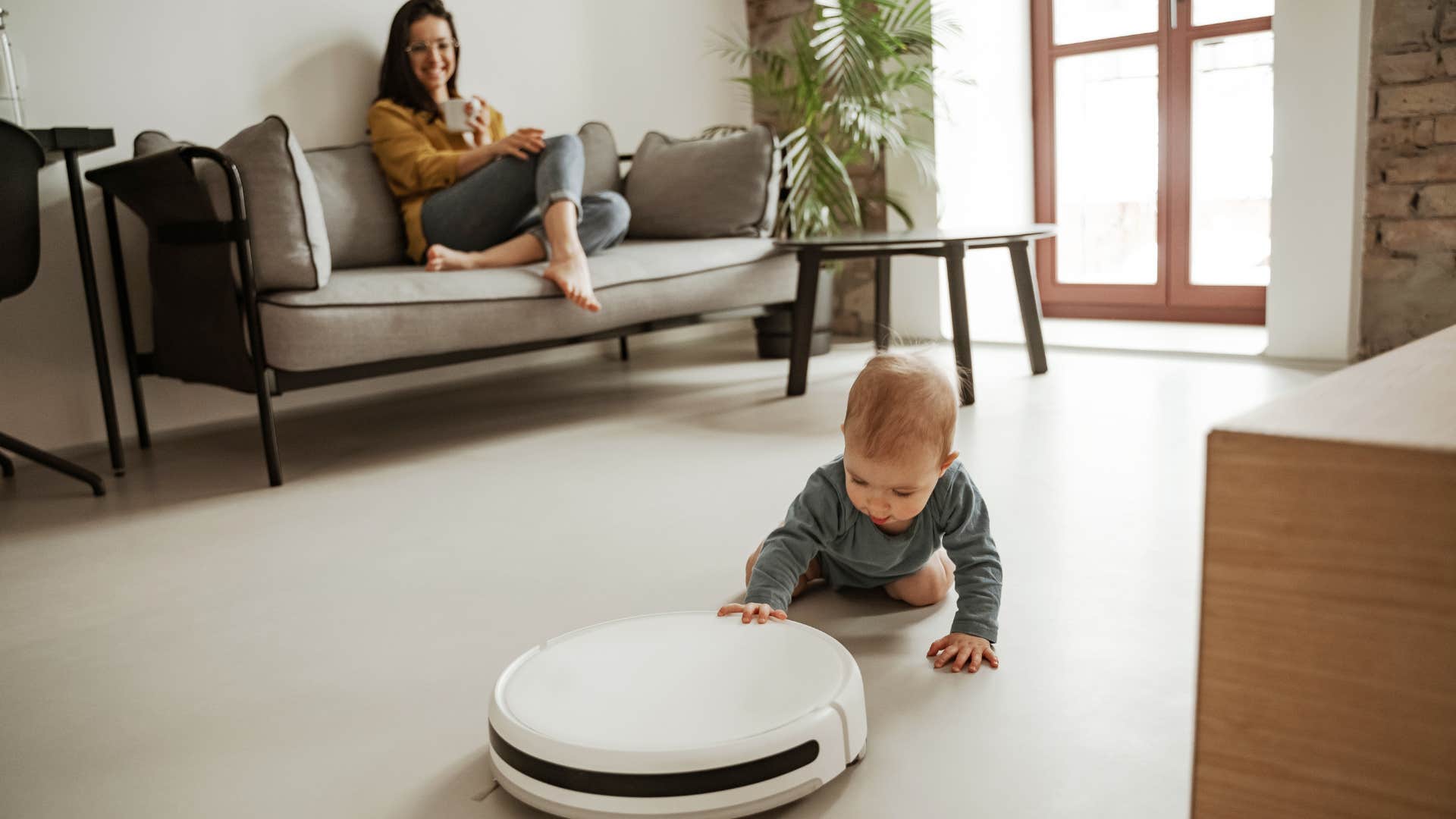 Ivan Dudka | Shutterstock
Ivan Dudka | Shutterstock
It doesn't matter how tidy they claim to be, lazy people know that cleaning the floors is a chore best left to technology. That's where robot vacuums come in. These little compact heroes glide by picking up dust and sometimes mop up messes left throughout the home.
Rather than getting up to do it themselves manually, people have come to rely heavily on these types of devices to do the hard jobs that they don't have time to do anymore. Among existing robot vacuum users, 62% operate them at least four times a week with 89% of users spending less than an hour vacuuming thanks to the machine.
Even those with hefty incomes who could afford cleaning services still use these little gadgets to clean up messes they failed to see or notice.
2. Takeout menus
 Twinsterphoto | Shutterstock
Twinsterphoto | Shutterstock
One of the little things lazy people have in their homes, no matter how much money they make, is takeout menus from all the local restaurants. Often used when they don't feel like cooking in their own kitchen, lazy people will rely on these delivery services to satisfy their hunger or cravings. They also utilize delivery service apps.
According to a study published in the Journal of Community Health, among young adults aged 18 to 25, food delivery apps are especially popular, with most of them using the apps approximately twice per week. Food delivery is universal, no matter what tax bracket you are in. However, for lower income people, the fees alone make them not want to order.
While fees might not bother wealthier people, many of them won't tip for the service. Regardless of their income, lazy people order through these third parties because they see it as easier than heading to a restaurant or cooking at home.
3. Blankets in every room
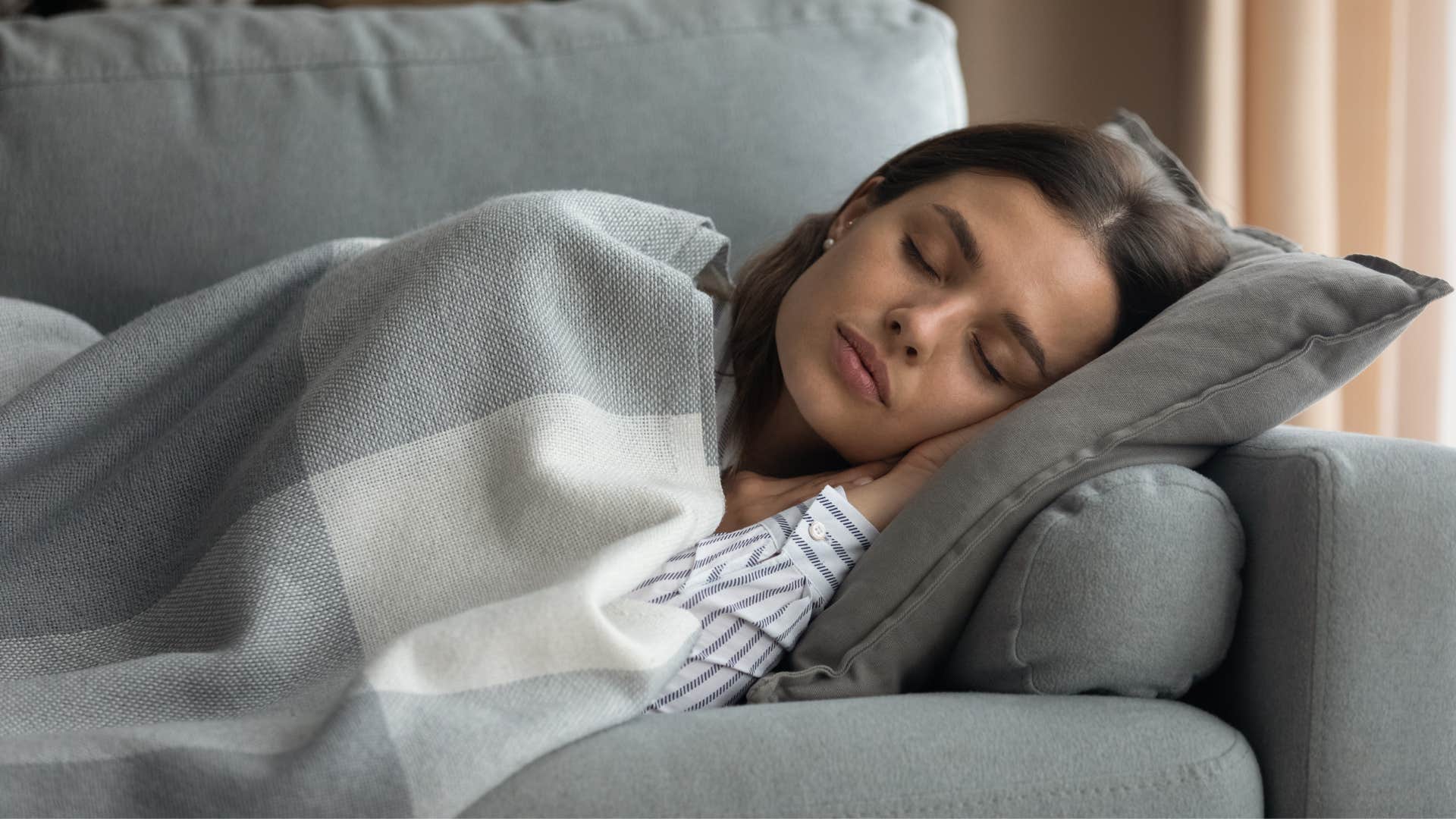 fizkes | Shutterstock
fizkes | Shutterstock
Having a blanket laying on the couch to keep you warm while watching television can be nice, but keeping another one on your office chair, in the bathroom, and in the bedroom is often something lazy people do. Lazy people have mastered the art of having multiple things hidden around every room because it makes their lives a little easier.
They no longer have to wake up and run down stairs to fetch a blanket, because they already have one everywhere. These blankets aren't just pretty decor pieces; rather, they are reliable, always there to keep them warm, and help them relax.
4. A bedside food and drink station
 AT Production | Shutterstock
AT Production | Shutterstock
No matter how pristine their bedroom might look, lazy people will bring food and drinks into their bed, especially if they are watching television. By turning their nightstands or wardrobes into snack and drinking stations, they are setting a standard for what they want conveniently to be around them at night.
For many, having a bottle of water next to you is understandable, but others might draw the line on having a bowl of potato chips or other messy snacks in the bed with them. It's all a matter of preference, and lazy people love to have something to eat right before bed.
Even those with plenty of disposable income may cling to this habit because convenience is a universal behavior. It's all a bit ironic, as having a snack on the bed will undoubtedly lead to crumbs, which lazy people have to clean later on.
5. Phone chargers in every room
 Pixel-Shot | Shutterstock
Pixel-Shot | Shutterstock
Chargers are a daily item that most people carry around with them in some form of capacity. Whether it's in their cars or on their person, they have a backup plan in case something happens to their phone battery. Many are constantly worried about their phones dying at home or in public spaces, which cause them to carry different chargers.
Lazy people own all kinds of different chargers, from power banks to wired and wireless chargers for any brand of phone. And according to a survey from OnePlus, around 88% of phone users use a wired charger, while 46% use car chargers, and only 19% regularly use a power bank. In their homes, having a charger in every room keeps their minds from worrying.
6. Command hooks and stick-on organizers
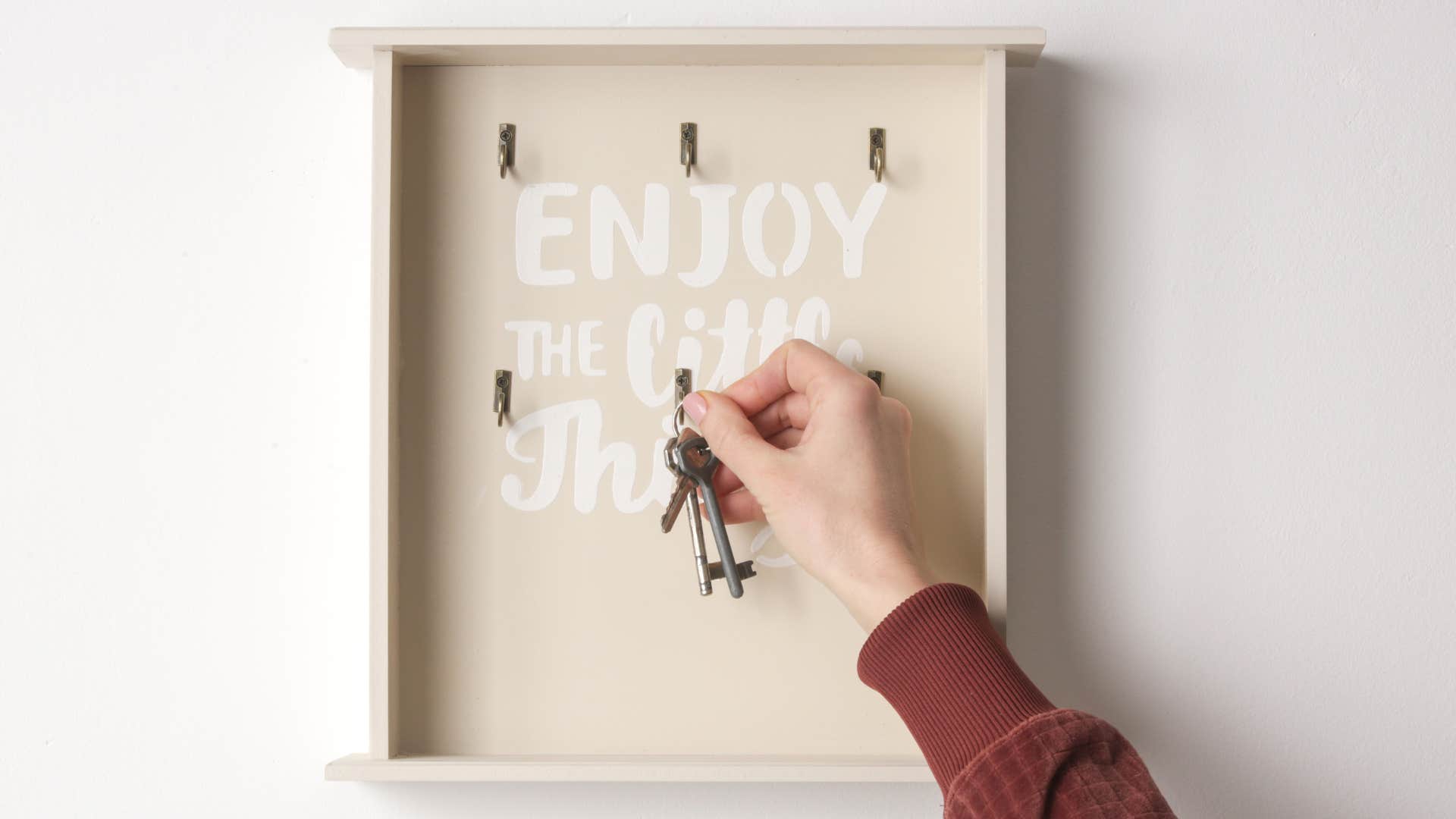 triocean | Shutterstock
triocean | Shutterstock
When it comes to organizing the walls of a home, everyone loves a shortcut. Command hooks and stick-on organizers placed on the walls to hang decor are efficient for lazy people who live in apartments, because it allows them to decorate without damaging or puncturing the walls. A wall-mounted key holder can neatly keep their essentials hanging so they never lose them.
Not only are they cost efficient, but they save them time looking for something so small. There are too many times when we are trying to leave the house but lose our keys, and a key holder or hooks on the wall make it easier.
These tools are also not limited to income level. Many wealthier individuals use these types of decor as well, making it a staple for any lazy home.
7. Storage ottomans
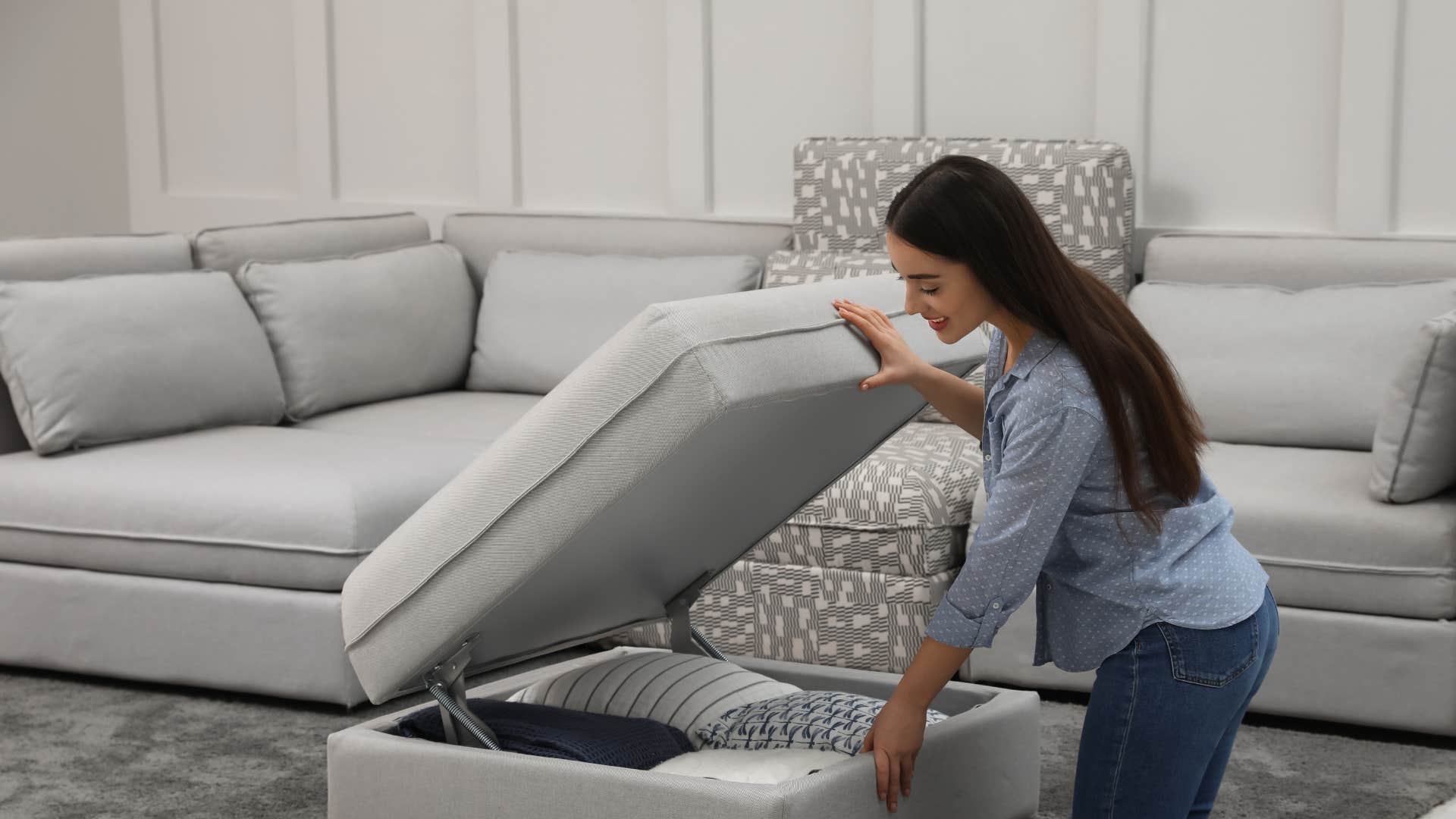 New Africa | Shutterstock
New Africa | Shutterstock
While ottomans are often used as foot rests, they are also one of the little things lazy people have in their homes, no matter how much money they make, because they store items. In fact, across different socioeconomic backgrounds, people gravitate toward multifunctional furniture because they combine seating, surface, and hidden storage.
Storage ottomans are lazy peoples' secret places where they hide things or put items in when they're too lazy to put it anywhere else. Need a place to stash extra couch pillows, random chords, or even piles of newspapers that you will never read? An ottoman is the right piece of furniture.
Not only does it serve a multipurpose function like a seat, but it can in some instances be used as a table. Lazy, money-conscious people love this aspect of it because they throw clean or dirty laundry everywhere. It's a convenient type of furniture that is trusted by those who don't want to do much.
8. Extra sets of bedsheets
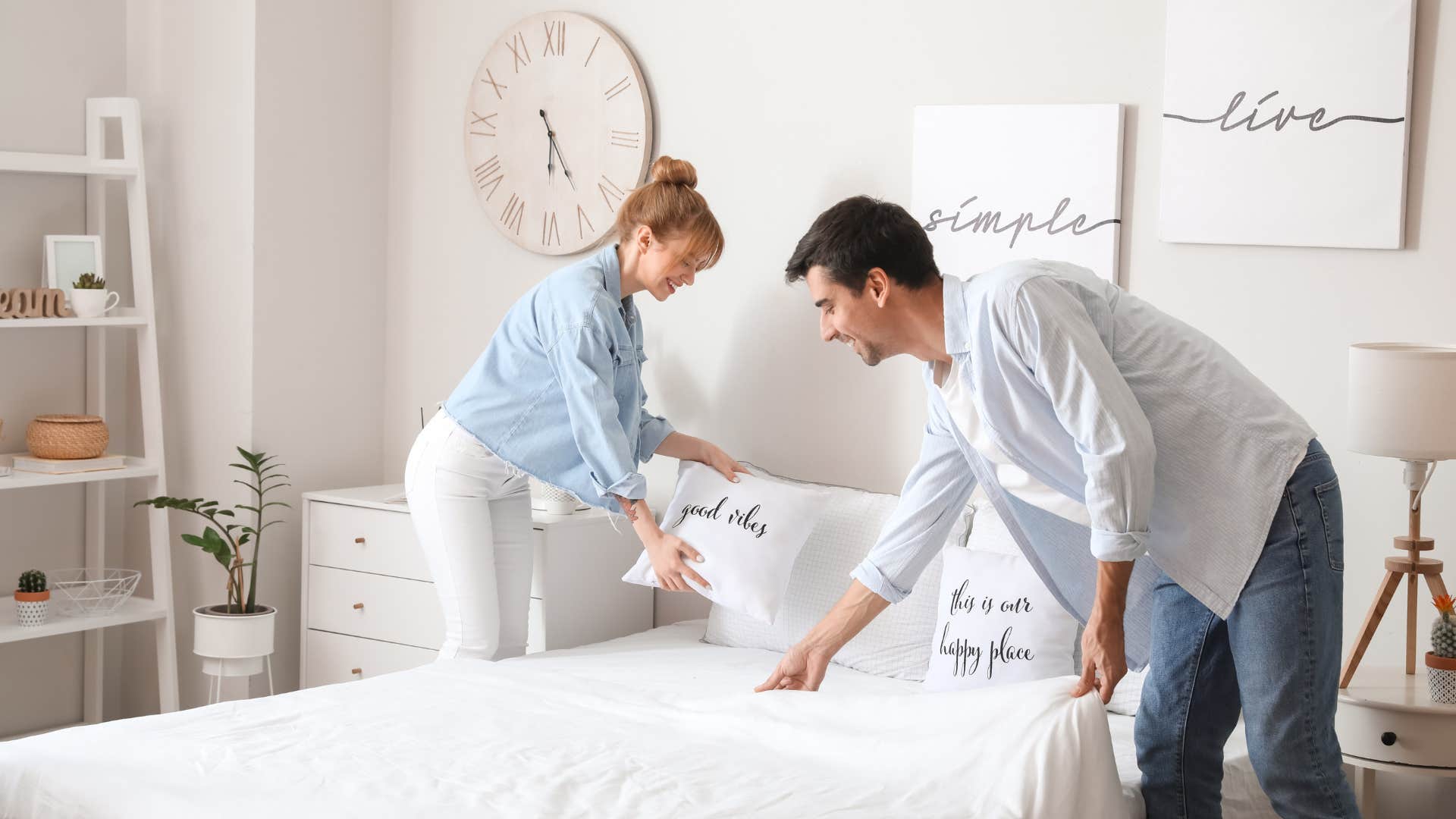 Pixel-Shot | Shutterstock
Pixel-Shot | Shutterstock
Having an extra set of sheets is actually a smart move. For lazy people, it saves you time rewashing the current ones. Changing the sheets is a daily hygienic habit that people are supposed to do. By placing new sheets on the bed, not only are you making your room look tidy but it will help your skin and protect your overall health.
A study from Amerisleep found that around 41% of the bacteria found in unwashed sheets are gram-negative, a type of bacteria known for being more resistant to antibiotics. This is why health experts recommended that people wash their sheets and pillowcases at least once per week to reduce the build-up of these harmful microbes that affect your skin, breathing, and health.
9. Paper plates and disposable cutlery
 Sam Salaubie | Shutterstock
Sam Salaubie | Shutterstock
Every household has their own form of cheap or disposable cutlery they use from time to time. But it's one of the little things lazy people have in their homes, no matter how much money they make, that you will always find. While wealthier people might bring these out for large parties, lower income households use them for every occasion.
Sometimes you're just too lazy to do the dishes and would rather use something simple and convenient. Other times, it's easier to use paper plates or disposable cutlery to save yourself from the stress of cleaning. Despite many people claiming that they are bad for the environment, they can't deny that it's an easier method than constantly wasting water by cleaning dishes.
10. All-in-one shampoo and conditioner
 Matej Kastelic | Shutterstock
Matej Kastelic | Shutterstock
Having a shampoo and conditioner combo is something extremely common for lazy people who don't want to pay for two separate bottles. This kind of product is for people in a low-maintenance mindset who want to put minimal effort into their hair.
While these products might be convenient, they can also dry out your hair or worse damage it in the long run. Thanks to scientific breakthroughs, like a study published in Skin Pharmacology determined, shampoos now use microfine dimethicone droplets suspended in the formula to clean and condition hair in one step. However, many hair experts caution that build-up and over-conditioning from these products can sometimes damage your hair.
Damaged hair can be more expensive to treat or heal than simply buying a stand-alone shampoo and conditioner set. So, lazy people might have their heads in the right place wanting to cut their shower time down, but at the cost of their hair being healthy.
11. A designated clothes chair
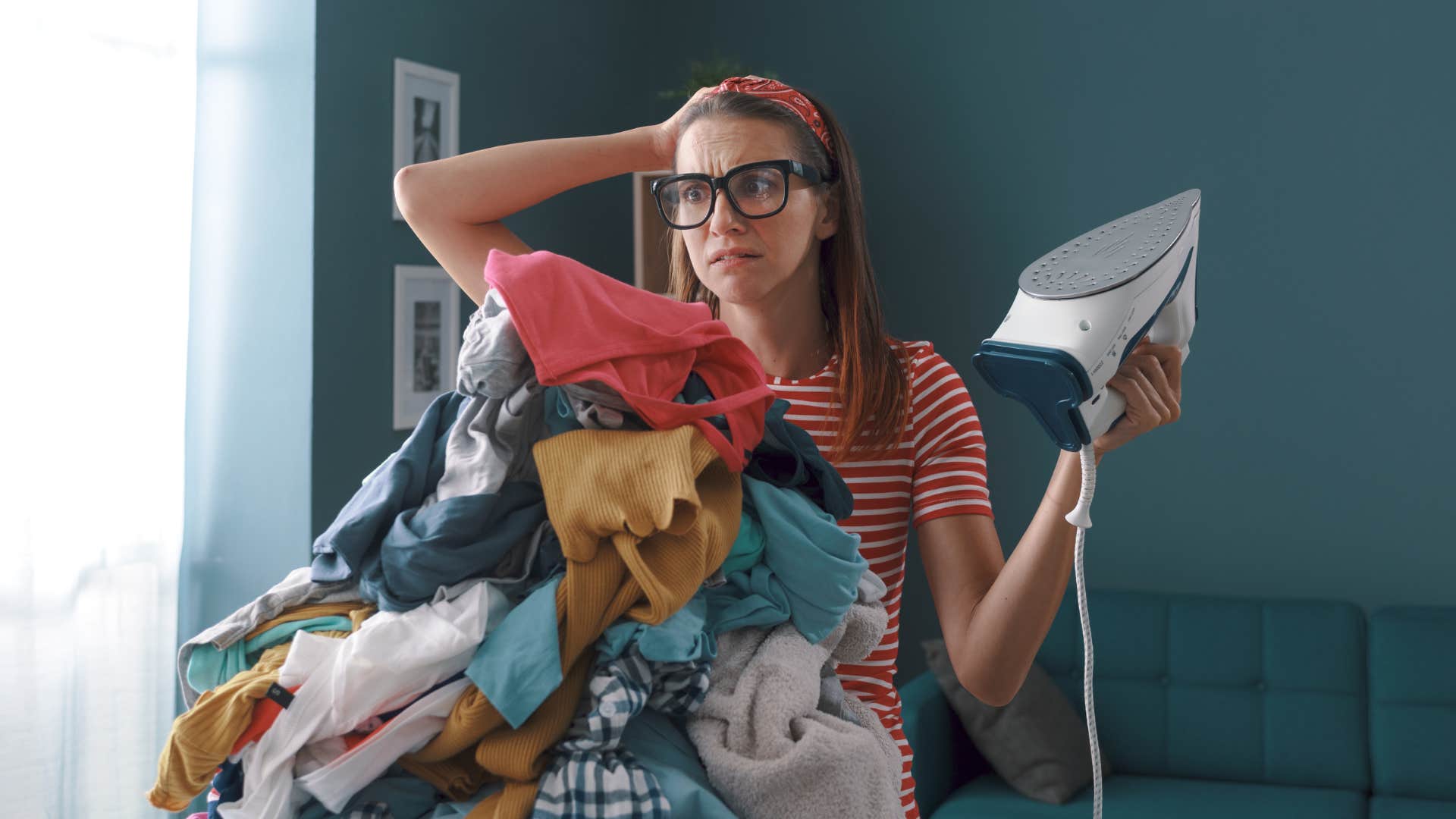 Stock-Asso | Shutterstock
Stock-Asso | Shutterstock
While the ottoman is a good place for lazy people to pile their clothes on top of, other locations around the house work just as well, especially the chair in the bedroom or living room. Lazy people will toss their clothes on their floors and leave them there until laundry day, so the chair serves as sort of an "in between" location.
Some people from lower income households don't have access to laundry services, so they have no choice but to have piles of clothes on a piece of furniture or in their hampers. Despite the inequality, lazy people have the same mannerisms of placing the clothes anywhere there is space to place them. Until laundry day, lazy people oddly find comfort surrounded by mountains of their dirty clothes.
Sylvia Ojeda is an author with a decade of experience writing novels and screenplays. She covers self-help, relationships, culture, and human interest topics.

